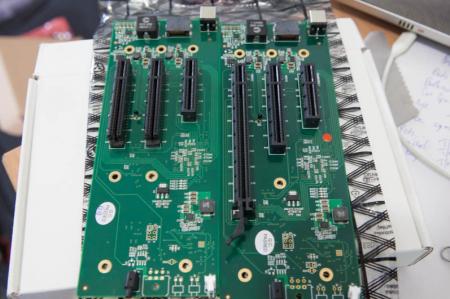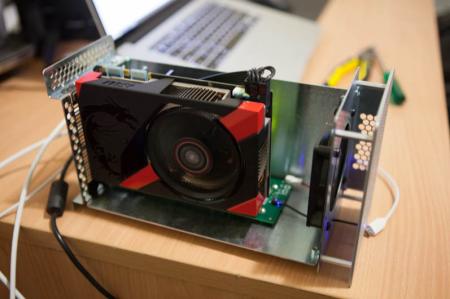Search the Community
Showing results for tags 'mac mac egpu'.
-
Hi guys, Following on from @squinks' work: http://forum.techinferno.com/implementation-guides/6689-%5Bguide%5D-2013-15-macbook-pro-gt750m-gtx780ti%4016gbps-tb2-sonnet-ee-iii-d-win8-1-a.html#post91182 I have finally got my Sonnet Echo Express SE II working with the MSI Nvidia GTX760 and my late-2013 Macbook Pro 15" which I custom ordered to have only the Intel Iris 5200 GPU. It is also a quad-core with 16GB ram and 512GB SSD. I am powering the card using a Corsair RM650 because that is what was easily available, fully modular (so I only need the PCIe power cable) and has a power switch easily accessible. I am running Windows 8.1 which I have installed UEFI using this guide. Originally when I received the Sonnet I found out that the PCI slots were only 8x length and so you could not insert the graphics card which is 16x length. Because I am a bit of an idiot and couldn't find a google answer easily enough I tried to hack off the end of the slot with a utility knife. Unfortunately it seems that when I did that I put too much pressure on the PCB and broke it. I received the new board yesterday and you can see in the photo below that it looks like in the later revision (right) they changed the left slot from an 8x to a 16x so you don't have to hack up the slot like I (failed) to do. It is a shame that they didn't extend both of the slots as there would be more airflow if the middle slot was 16x too as the edge of the enclosure would be further apart. Also, the power cables only just fit and are under some pressure when the case is on, I haven't been able to find many 90 degree 'low-profile' PCIe power cables but that would solve this problem. In terms of operation it is a bit of a pain. If the Sonnet and the graphics card are powered when you turn on the machine then Apple's BIOS disables the Intel GPU. This will work perfectly with an external screen but if you have used one of these MacBooks you will know how incredibly good the MacBook's screen is. To get Optimus (or to install drivers) my turnon sequence is: 1. Turn on machine with only the Sonnet plugged in (PSU off). It annoyingly doesn't have a power switch but will turn on when the Thunderbolt cable is plugged in and MacBook is powered on. Hold down the alt/option key so you can select Windows. 2. As soon as the Apple startup chime is heard turn on the PSU (and therefore the graphics card). 3. Quickly start up Windows. I suspect something is happening with the Sonnet's power settings that if you delay then the GPU is not detected. Weird. 4. You should be able to tell the GPU has started as Windows does some strange stuttering on startup only (e.g. typing in password is strangely laggy) but this is completely gone after logging in. I haven't got that many benchmarks but you can see it is running correctly over Thunderbolt 2.0: CUDA-Z Performance Information ----------------------- Memory Copy Host Pinned to Device: 1262.49 MiB/s Host Pageable to Device: 1128.11 MiB/s Device to Host Pinned: 1352.1 MiB/s Device to Host Pageable: 1206.5 MiB/s Device to Device: 64.3746 GiB/s If you do the maths then Host to Device (1262)+Device to Host (1352) then we are getting pretty good speeds: 2614 (Megabyte / s) = 20.421875 Gigabit / s Also, you can see this is much higher than the Thunderbolt 1 Thundertek CUDA-Z score (for Device to Host only) of 790MiB/s vs 1352.1 MiB/s (171%). Now if only we had some other manufacturers interested they could quickly address these BIOS/EFI level issues and we could have true plug-and-play eGPUS!
- 26 replies
-
- 6
-

-
- apple egpu
- diy egpu
- (and 7 more)



